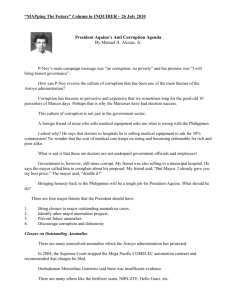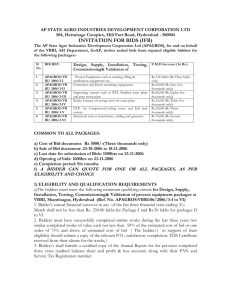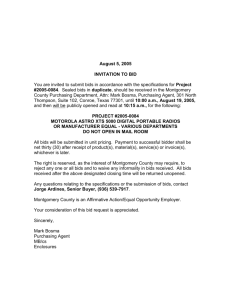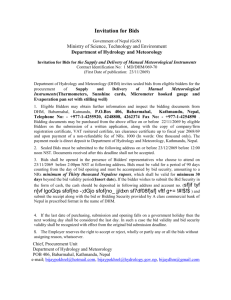I - FRAUD AND CORRUPTION A – DEFINITION
advertisement
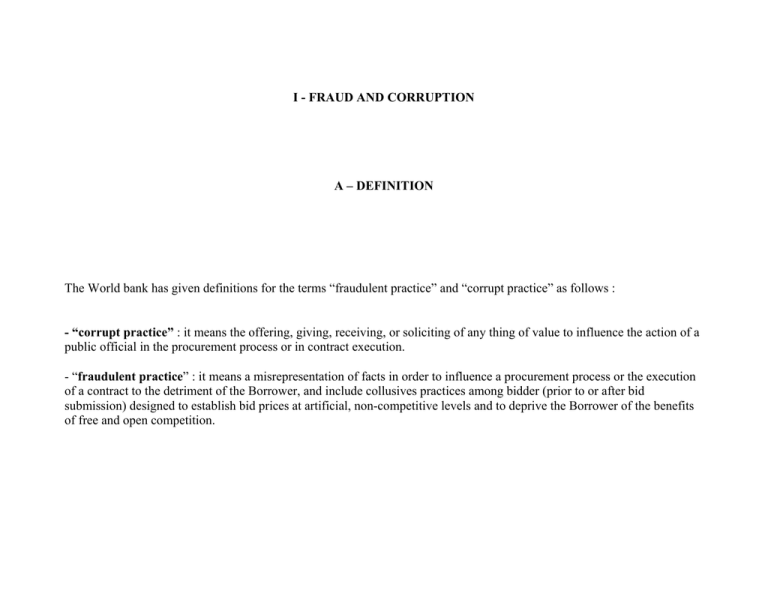
I - FRAUD AND CORRUPTION A – DEFINITION The World bank has given definitions for the terms “fraudulent practice” and “corrupt practice” as follows : - “corrupt practice” : it means the offering, giving, receiving, or soliciting of any thing of value to influence the action of a public official in the procurement process or in contract execution. - “fraudulent practice” : it means a misrepresentation of facts in order to influence a procurement process or the execution of a contract to the detriment of the Borrower, and include collusives practices among bidder (prior to or after bid submission) designed to establish bid prices at artificial, non-competitive levels and to deprive the Borrower of the benefits of free and open competition. B – CONSEQUENCES - Rejection of proposal for award if bidder has engaged in corrupt or fraudulent practices for the contract in question. - Cancelation of the loan allocated if it is determined at any time that corrupt or fraudulent practices were engaged by the Borrower, when the Borrower has not taken appropriate action to remedy the situation. - Refusal to be awarded a bank-financed contract to firms engaged in corrupt or fraudulent practices in competition for or in executing a bank-financed contract. II – NECESSARY GUARANTEES TO AVOID FRAUD AND CORRUPTION AT DIFFERENT STEPS A - NOTIFICATION AND ADVERTISING Timely notification of bidding opportunities is essential in competitive bidding. Content of the notice : - information on the Borrower : agency responsible for procurement - amount and purpose of the loan Publication of prequalification bidding documents : - many weeks before the publication of the notice - invitations to prequalify or to bid in national newspapers - invitation to embassies of countries of the likely suppliers and contractors - publication in newspapers and trade publication of wide international circulation B - PREQUALIFICATION OF BIDDERS Prequalification is usually necessary for large or complex works. Invitations to bid are extended only to those who have adequate capabilities and resources. Prequalification shall be based entirely upon the capability and resources of prospective bidders to perform the particular contract satisfactorily, taking into account their experience and past performance on similar contracts, capabilities with respect to personnel, equipment and construction or manufacturing facilities, and financial position. C – GUARANTEES IN BIDDING DOCUMENTS 1 - VALIDITY OF BIDS : Bidders shall be required to submit bids valid for a period specified in the bidding documents which shall be sufficient to enable the Borrower to complete the comparison and evaluation of bids. The amount specified in the bidding documents shall not be set so high as to discourage bidders. 2 - CLARITY OF BIDDING DOCUMENTS : - CLARITY IN THE DESCRIPTION OF THE WORK TO BE DONE : Bidding documents shall permit and encourage international competition and shall set forth clearly and precisely : . the price and any other factor to be taken into account in evaluating bids and how such factors will be evaluated . the work to be carried out . the location of the work . the goods to be supplied . the place of delivery or installation . the schedule for delivery or completion . minimum performance requirements . any other pertinent terms and conditions… - SOME CLARITY APPLICABLE TO EVERY BIDDER : All prospective bidders shall be provided the same information, and shall be assured of equal opportunities to obtain additional information on a timely basis. Any additional information, clarification, correction of errors or modifications of bidding documents shall be sent to each recipient of the original bidding documents in sufficient time before the deadline for receipt of bids to enable bidders to take appropriate actions. If necessary, the deadline shall be extended. D - BID OPENING 1 - TIME FOR PREPARATION OF BIDS : The time allowed for the preparation and submission of bids shall be determined with due consideration of the particular circumstances of the project and the magnitude and complexity of the contract. Bidders shall be permitted to submit bids by mail or by hand. The deadline and place for receipt of bids shall be specified in the invitation to bid. 2 - BID OPENING PROCEDURES : The procedures are governed by the principle of transparency at any step of it : The time for the bid opening shall be the same as for the deadline for receipt of bids or promptly thereafter, and shall be announced, together with the place for bid opening, in the invitation to bid. The Borrower shall open all bids at the stipulated time and place. Bids shall be opened in public. Bidders or their representatives shall be allowed to be present. 3 - CLARIFICATIONS OR ALTERATIONS OF BIDS Bidders are not allowed to alter their bids after the deadline for receipt of bids. The Borrower shall ask bidders for clarification needed to evaluate their bids but shall not ask or permit bidders to change the substance or price of their bids after the bid opening. Requests for clarification and the bidders’ responses shall be made in writing. 4 - CONFIDENTIALITY Confidentiality is required during the procedure (bidders or other persons officially concerned) : information relating to the examination, clarification, evaluation of bids and recommendations concerning awards, until the successful bidder is notified of the award. 5 - EXAMINATION OF BIDS : The bidder shall not be permitted to correct or withdraw material deviations or reservations once bids have been opened (price adjustment provisions applying to the period of implementation of the contract shall not be taken into account in the evaluation). 6 - EVALUATION AND COMPARISON OF BIDS : The purpose of bid evaluation is to determine the cost to the Borrower of each bid in a manner that permits a comparison on the basis of their evaluated cost. The bid with the lowest evaluated cost, but not necessarily the lowest submitted price, shall be selected for award. Bidding documents shall specify the relevant factors in addition to price to be considered in bid evaluation and the manner in which they will be applied for the purpose of determining the lowest evaluated bid. The factors other than price to be used for determining the lowest evaluated bid shall, to the extent practicable, be expressed in monetary terms, or given a relative weight in the evaluation provisions in the bidding documents. Bid evaluation for works shall be strictly in monetary terms. Any procedure under which bids above or below a predetermined assessment of bid values are automatically disqualified is not acceptable. The Borrower shall prepare a detailed report on the evaluation and comparison of bids setting forth the specific reasons on which the recommendation is based for the award of the contract. 7 - EXTENSION OF VALIDITY OF BIDS An extension of bid validity, if justified by exceptional circumstances, shall be requested in writing from all bidders before the expiration date. The borrower shall award the contract, within the period of validity of bids, to the bidder who meets the appropriate standards of capability and resources and whose bid has been determined to be substantially responsive to the bidding documents and to offer the lowest evaluated cost. Rejection of all bids is justified when there is a lack of effective competition, or bids are not substantially responsive. Lack of competition shall not be determined solely on the basis of the number of bidders. If all bids are rejected, the Borrower shall review the causes justifying the rejection and consider making revisions to the conditions of contract, design and specifications, scope of the contract, or a combination of these, before inviting new bids. 8 – DOMESTIC PREFERENCES At the request of the Borrower, and under conditions to be agreed under the Loan Agreement and set forth in the bidding documents, a margin of preference may be provided in the evaluation of bids for : - goods manufactured in the country of the Borrower when comparing bids offering such goods with those offering goods manufactured abroad. - Works in member countries below a specified threshold, when comparing bids from eligible domestic contractors with those from foreign firms. Where preference for domestically manufactured goods or for domestic contractors is allowed the methods and stages set forth shall be followed in the evaluation and comparison of bids. E – CONTROL AND UNDERTAKING 1- CONTROL The financing Bank have the right to inspect the account of suppliers and contractors and records relating to the performance of the contract. 2- UNDERTAKING The Borrower introduces into bid forms an undertaking of the bidder to observe in competing for and executing a contract the country’s law against fraud and corruption including bribery. III - THE EXAMPLE OF THE EUROPEAN UNION A - EUROPEAN TEXTS Certain instruments have been developed by the EU itself as part of its anti-corruption policy and of its programme for combating organised crime. The EU has participated in the negotiations leading to the OECD and Council of Europe Conventions. The EU’s own action in public corruption : - There are specialised instruments : the Convention of July 1995 on the protection of the European Communities’ financial interests and its protocols ; the Convention of May 1997 on the fight against corruption involving officials of Member States of the EU . But these documents have only been ratified by a very limited number of Member States. - There are also a general documents which are applicable in this matter : . The OECD Convention of November 1997 is about “combating bribery of foreign public officials in international business transactions”. It represents the key element of the international body of rules combating cross-border corruption and it is the only instrument which is already operational. 7 Member States have already ratified the OECD Convention and transposed its contents into national law (Convention adopted in November 1997) and it has been enter into force in February 1999. . The Council of Europe Conventions : The Criminal Law Convention and the Civil Law Convention on Corruption adopted by the Council of Europe includes Central and Eastern Europe as well as Russia; The Criminal Law Convention is broadly similar in structure and contents to the EU Convention. Both conventions also provide for the protection of “whistleblowers”. The Criminal Law Convention, which has been opened for signature since January 1999, has already been signed by 12 Member States of the EU. The Civil Law Convention was opened for signature in September 1999 and 5 Member States have signed it. About the protection of “whistleblowers”: “whistleblowers” ran the risk of being professionally discriminated or even of losing their job. They were often left without the appropriate legal protection. But more and more organisations recognise that encouraging staff members to be vigilant and to “blow the whistle” on serious cases of fraud can act as a major deterrent against financial malpractice. Each party commits itself to provide for appropriate protection for those employees and officials who report criminal offences or their suspicion to responsible persons and authorities. - There is also Community Legislation : the Public Procurement Directives : This is about procurement rules within the EU – not in foreign aid programmes. In the Green Paper of the commission in 1997 on public procurement in the EU, the objective would be to explore how the application of the provisions in the area of public procurement relevant to the fight against corruption could be improved. The Communication (COM (98) 143 of 11 March 1998) “Public Procurement in the EU” mentions the possibility for public procurement entities of entering into anti-corruption pledges and a corresponding obligation on tenderers to agree that they will not use bribery to obtain a contract. The “ethics clauses” contained in paragraph 7 of the Manual of procedural Rules prepared by the Common Service Relex and recently adopted by the Commission are an excellent model that should be used not only for foreign aid programs, but for intra-EU procurement as well. The most effective sanction usually is the “blacklisting” of companies that have violated the no-bribery rules : “Blacklisting” means that persons and companies who have engaged in corrupt practices in the award of public contracts should be excluded on a temporary or permanent basis. The World Bank, for example, has established its own procedures to detect fraud and corruption and to blacklist firms accordingly. “Blacklisting” should be extended to the Community and to the Member States. A company which has been found guilty of corrupt practices in one Member State should indeed not continue to have access to public tender procedures or other public financing in other Member States or at Community level. B - FOREIGN AID PROGRAMS : PRINCIPLES OF GOOD GOVERNANCE Good governance, which is defined as “transparent and accountable management of all resources of a country for its sustainable economic and social development”, has become a central issue in the EU’s cooperation relations with third countries. (cf “post-Lomé” negociations). Good governance is indeed not only a precondition for development ; it is also the result of reform. Performance in Terms of “Good Governance “ as a criterion for Aid Allocation Aid allocation cannot be based exclusively on criteria of needs ; it must also take account of country’s performance. A draft “Manual of Procedural Rules”, approved by the Commission, regulates procurement procedures for service, supply and works contracts in all third countries. This manual covers only the contract award process, but another document is being worked out concerning the contract implementation phase. These documents mainly deal with the behaviour of tenderers and contracting parties and the attitude of the contracting authority (Government/Commission) towards them. Relationship between the Commission and the contracting Government is defined in the financing agreement on each project : a clause authorises the Commission to suspend or cancel the financing of a project if corrupt practices are discovered and if the Government fails to take appropriate measures to remedy the situation.

